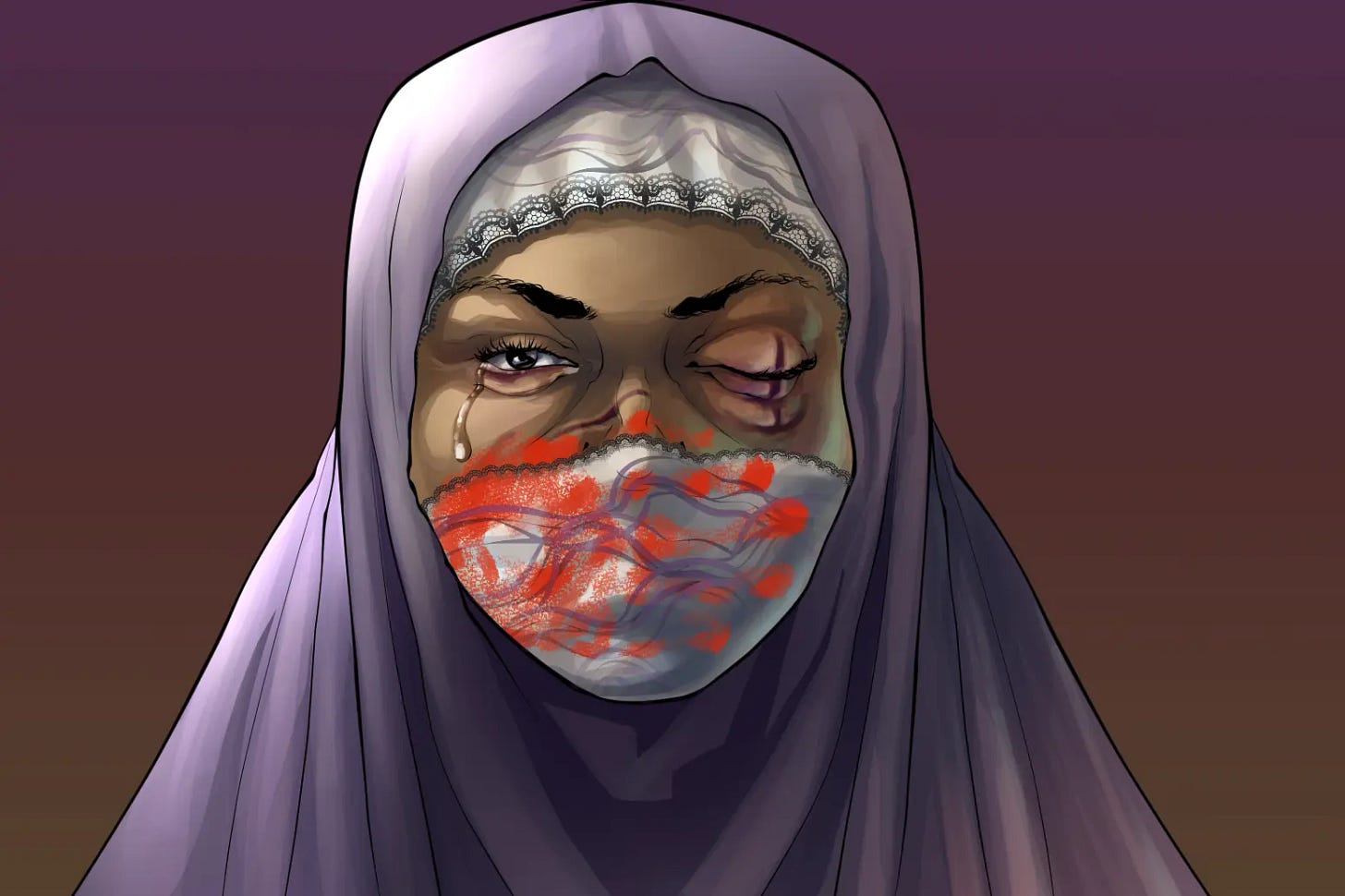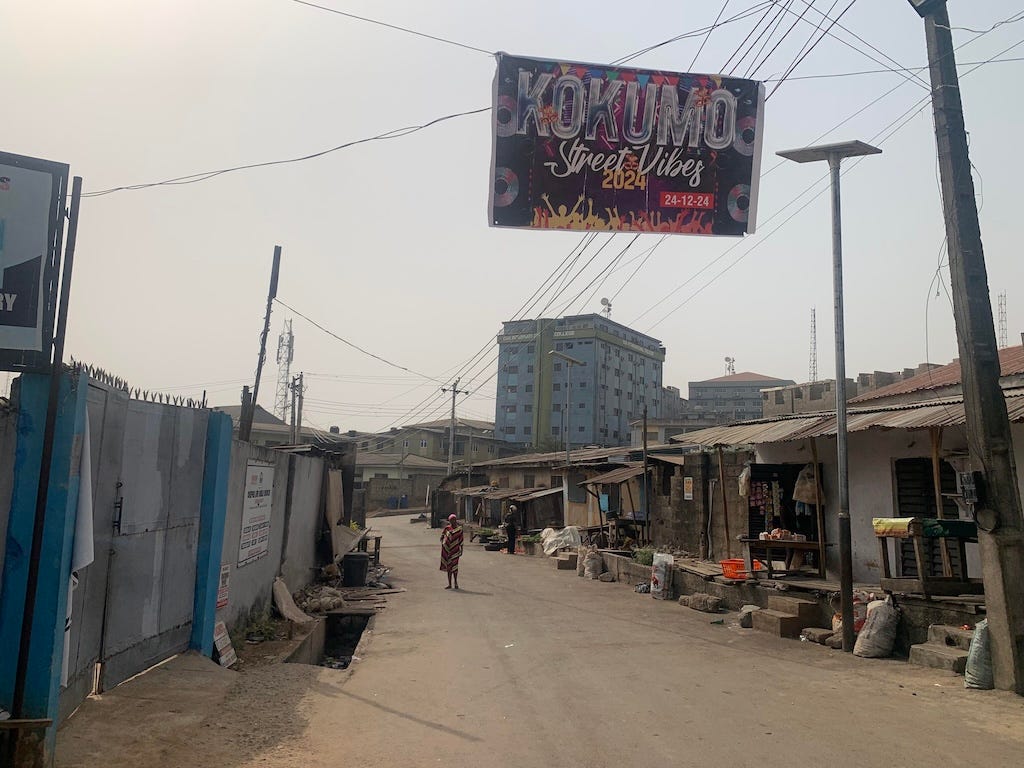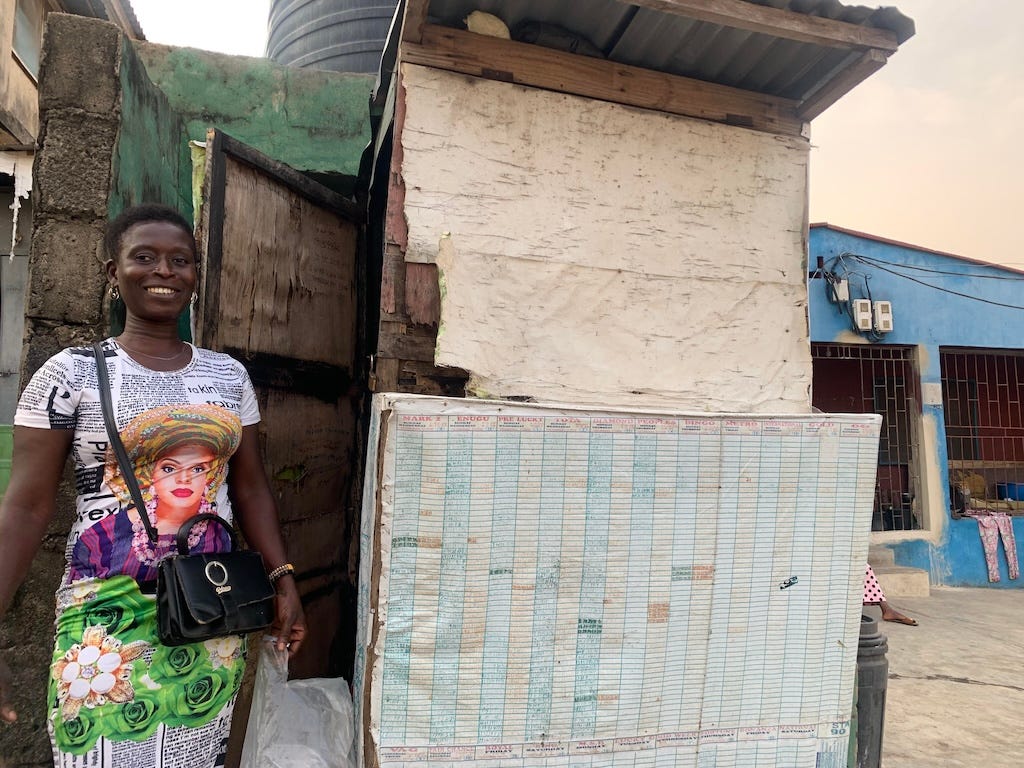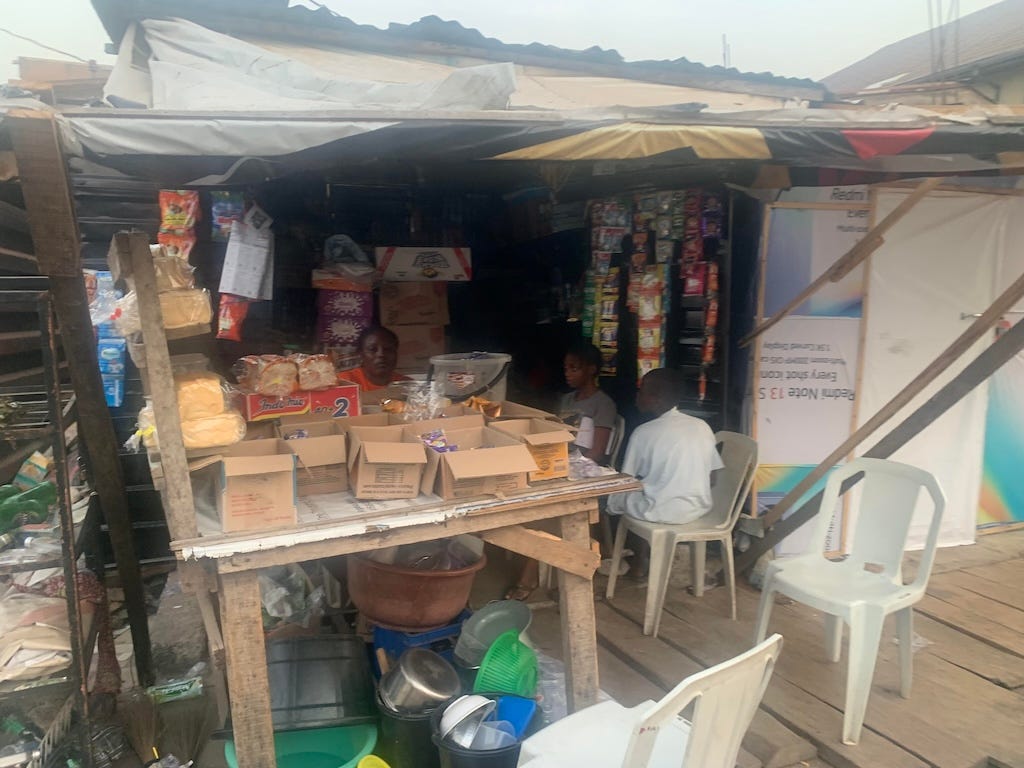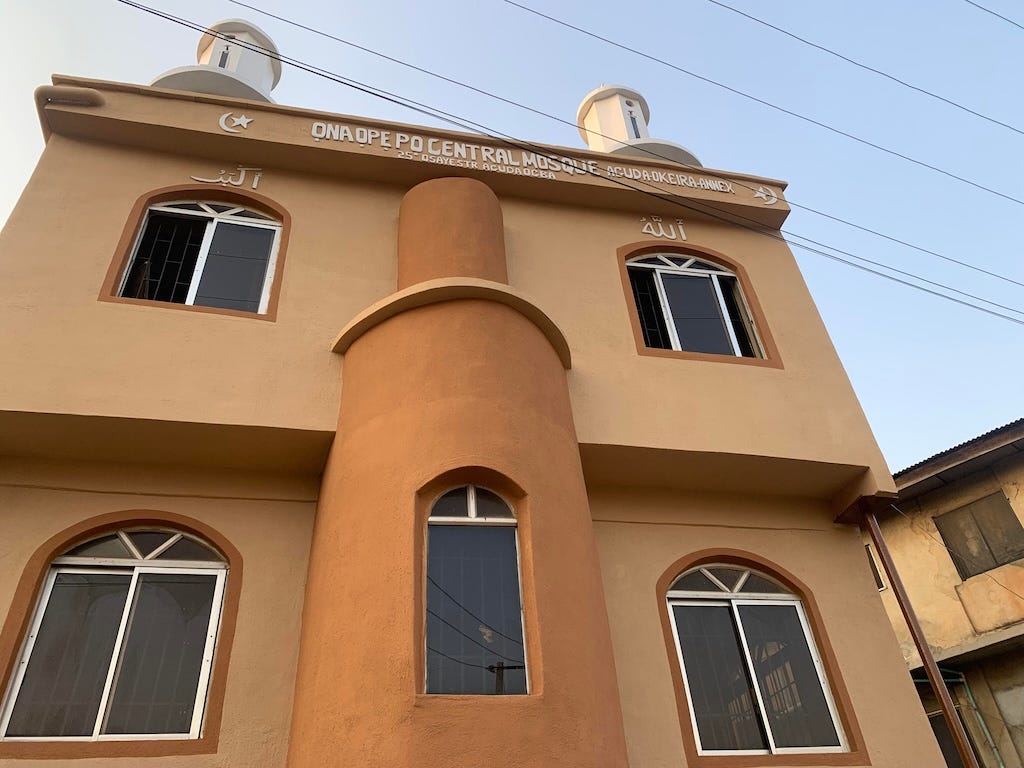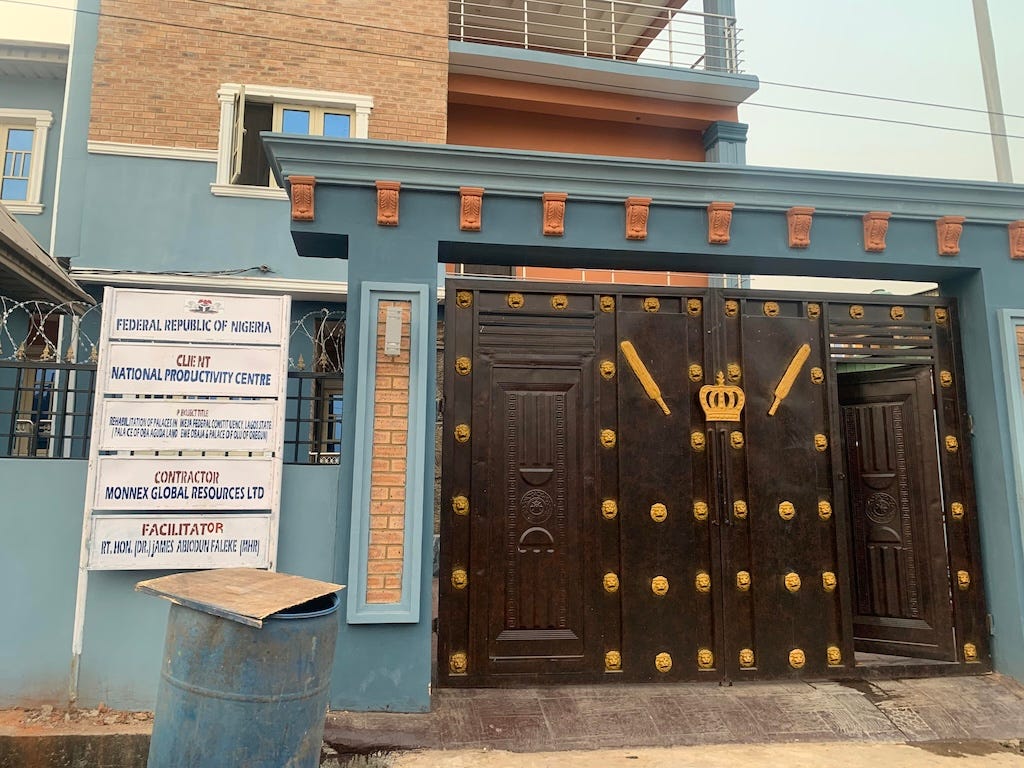“Who will lend us money now?” – How domestic violence robbed Kokumo street
Alhaja’s POS spot was nestled in front of a compound near the centre of the street.
By Simbiat Bakare
“I miss her! I really miss her!” Olajumoke Falade, a resident of Kokumo Street, said as she counted the naira notes in her hands. She frowned at the boy she had sent to collect the N15,000 at a Point of Sale (POS) vendor. The vendor had charged a N600 fee for the N15,000.
While strangers might need an introduction to who the “her” Ms Falade was referring to, the people around her needed no explanation.
Naima Adegoke, whom everyone in the area fondly called “Alhaja,” was beloved on Kokumo Street, a suburban community in Aguda-Ogba. A petite, cheerful woman, Alhaja was usually clad in a long purple or blue hijab, a bag stuffed with cash hanging from her shoulder.
In late 2022, when naira notes were scarce due to the Central Bank of Nigeria's plan to cease the use of old notes, people would gather around Alhaja, waiting on their turn to collect naira notes. Old, young, and middle-aged would hurry towards her for cash—it was almost like she was sharing a free Christmas meal. But she wasn’t. Alhaja was the only POS operator in the area who charged a fair percentage.
While many operators at the time charged twice the withdrawal fee – N200 for N5,000 and N400 for N10,000 –Alhaja charged half the amount: N100 for N5,000 and N200 for N10,000. Alhaja told this reporter her religion does not allow her to make undue profit.
Alhaja’s POS spot was nestled in front of a compound near the centre of the street. The house owner, Pa Tajudeen Adisa Sanni, said he allowed her a free space because she is respectful and her service is valuable to the community. Her set-up was simple: a plastic table, a single chair, and an umbrella to keep the sun away. On the table was her POS machine and a worn-out book populated with numbers. Until recently, she could be seen counting cash and chatting with customers on most evenings. Now, the spot is empty.
How Kokumo lost Alhaja
Last November, Alhaja’s husband, Adul’Rauf Adegoke, laid his hands on her in their mini-flat apartment. “I was beaten up by the father of my children,” Alhaja told me during a phone conversation.
Male violence against women is prevalent in Nigeria. At least one in three Nigerian women have experienced physical violence by age 15. A former online case manager at the Lagos State Domestic and Sexual Violence Agency (DSVA), Khadija Ibrahim, told me over 300 of such cases are reported every month.
On the day she was assaulted, Alhaja said she had attempted to take money from his pocket to feed their four children. He had given them N500 for lunch.
“I didn’t want my children to live in poverty, and since I know he had some money in his pocket, I tried to take more to give to the children,” Alhaja said.
When I suggested contacting Mr Adegoke for his side of the story, Alhaja pleaded against it, saying she feared the repercussions it would have on her children.
“I know this man well, and I know what he can do. He can turn his family against my children,” she said.
Also, Pa Sanni's attempts to confront Mr Adegoke failed. The 82-year-old chief told me Mr Adegoke ran at any mention of his wife. Community members also told me that Mr Adegoke travelled from his residence shortly after the incident. Alhaja had also left with her children.
Ms. Falade, who had witnessed the incident, recounted how she tried to de-escalate the situation. She explained that a neighbour called her attention to it. Although her appearance eventually stopped Mr Adegoke from battering his wife, she couldn’t get the couple to resolve the situation amicably.
“The husband didn’t regard anyone, and the wife too has made up her mind to leave,” Ms Falade said.
She expressed sadness about Alhaja’s decision to leave but understood her reasons.
“I couldn’t say that because I need her service; she shouldn’t leave a home where she is unsafe,” she said. “If women don’t feel safe in their homes, they won’t be able to render their services to anyone or do their jobs well.”
“Who will lend us money now?”
“I didn’t believe it when I heard Alhaja had left,” Busayo Ekwutozia, typically called Iya Ibeji Lotto, said.
Iya Ibeji Lotto manages a lottery business typically called “Baba Ijebu” next to where Alhaja operates her POS service.
Elaborating on how Alhaja was valuable to the community, Iya Ibeji Lotto said that on the day she did not have money to remit to her boss, Alhaja borrowed her N3,000. When it was time for her to repay, Alhaja refused to accept it.
“This business is still standing because of Alhaja,” Iya Ibeji Lotto said. “Because of her, I could keep the kiosk and still make some money for my family and me. I am still finding it hard to believe she has left.”
Mama County, who asked to be identified only by her nickname and lives next to the house where Alhaja operated her business, was upset when she spoke about Alhaja's impact on the community. She said Alhaja lends everyone money when they are in need and that she still owes her N5,000— a loan she took when her daughter needed to go to school.
Fatimah Akintayo, popularly called Mama Aisha, who owns a provision store opposite Alhaja’s space, also had good words for Alhaja.
“She is the only one that borrows people's money in the community. Who will lend us money now? Who can do such a thing?” Mama Aisha lamented.
Attempting to bargain Alhaja’s return, Mama Aisha said, “maybe they should find a way to settle.”
However, Mama Ibeji Lotto had a different idea— to get justice for Alhaja.
“Maybe everybody should gather and beat the man,” she said, frowning and tightening her fist.
Pursuing justice
In Nigeria, male violence against women and girls, including physical and economic abuse, is a crime. Section 34 of the Nigerian constitution provides that every individual is entitled to respect for the dignity of their person, and no person shall be subjected to torture or inhuman or degrading treatment.
The Criminal Code of Section 360 also prescribes that any person who unlawfully and indecently assaults a woman or girl is guilty of a misdemeanour and is liable to imprisonment for two years.
However, Alhaja told me justice has been hard to come by.
“When the issue happened, I initially called a contact I had at Area G police station, Ogba, but when my father heard about it, he told me not to involve the police because of the kids,” Alhaja said.
She said several people, including friends and family, advised her not to pursue justice but to return to her husband instead.
“They said he is looking sad. That I should go back.”
However, she told me she would not be reuniting with her spouse and that she had reported the incident to DSVA and, subsequently, the police.
“Getting justice is complex,” said Ololade Ajayi, founder of DOHS Cares Foundation, a non-governmental organisation that supports women, girls and children.
Ms. Ajayi noted that of the multiple cases of domestic violence her foundation has intervened in, only one has gotten justice.
“What justice looks like for survivors differs from what it looks like to non-victims,” she said. “Many survivors just want to be separated from their husbands while they take care of the children’s needs. They don’t want the men imprisoned. If they want the perpetrator held accountable, police typically seek money from survivors to visit the perpetrators or even treat the case, making some survivors abandon their quest for justice.”
According to her, the time needed to get justice at the courts also often demoralises victims.
Finding solutions
Women's rights activist Oluwafunmbi Ogunsola advised that beyond survivors seeking justice, male violence against women in communities must be mitigated through cultural modifications.
“Because if we have a culture of subjugation where men are seen as superior to women, what we are doing is excusing whatever act of violence committed against women,” she said.
Meanwhile, Mama Aisha suggested that the law should support women to form associations and take action on behalf of victims of domestic violence in their communities. She adds that more women will be willing to share their problems through this method.
Similarly, human rights practitioner Gladys Emmanuel advised that communities can form ‘male violence against women and girls’ committees.
“These committees will serve as community champions and can include traditional rulers, religious leaders, youth, women representatives, representatives from civil society organisations and law enforcement, to ensure that there is no hiding place for perpetrators and that justice is being done according to the law.”
Ms Ajayi also emphasised that community members and leaders must join the fight against domestic violence.“If they see something, they should say something,” she said. “Everyone should stand up to be a pillar of support to the woman, help in reporting the case to break the cycle of abuse. Every perpetrator must be punished.”
Community leaders make promises
“Ha! Our mosque does not condone a man beating his wife,” Alhaji Jumoh Abdul’Ghaniy exclaimed when I informed him of Alhaja’s assault.
The Head of Ona Ope Po Central Mosque in Aguda-Ogba, where Mr Adegoke worships, said the Quran only requires men to deny their wives sex and food during a conflict, not beat her.
Although Alhaji Abdul’Ghaniy confessed that he had once slapped his wife, he promised to preach against domestic violence regularly.
Similarly, the King of Aguda-Ogba, Oba Hakeem Agba Osi Saibu Ewe Obaja 1, pledged to intervene in issues concerning domestic violence in the community and urged community members to report such violence to the palace.
Oba Hakeem also advised the Lagos State Government to introduce a policy that would require married tenants to commit to not engaging in domestic violence, or else they would forfeit their tenancy.
When this reporter informed the Executive Secretary of DSVA, Ms Titilola Vivour-Adeniyi, of the proposed solutions, she said the government would “carry out more research, make a policy on it, and implement.”
Meanwhile, as residents of Kokumo Street strategise on how to avoid losing more valuable members of their community, Alhaja grapples with starting a new life in another area free from stigmatisation.
“I used to be very well respected at Kokumo; I got along with everyone,” she told me. “But I can’t say I will stay there because the community needs my service. The shame and embarrassment alone would be too much. I just want to restart somewhere no one knows me.”


